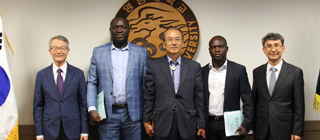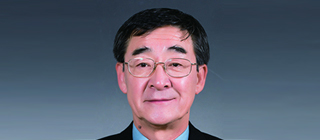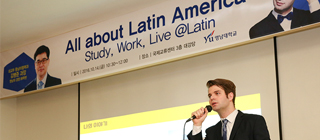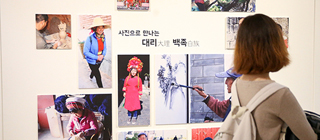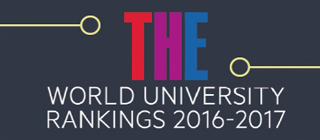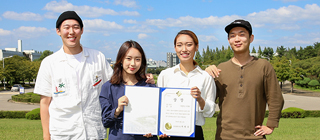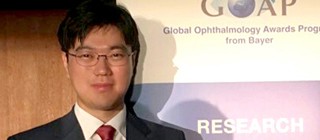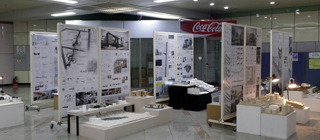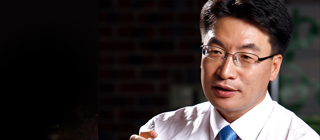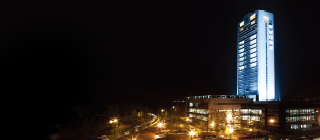-
Presidential envoy visits YU and requests personnel and fostering and council “The Saemaul Undong and Korea's development experience will be a great help in the development of our country" Cooperate in various ways such as policy advice and fostering personnel related to Saemaul [October 14, 2016] <The presidential envoy of the Central African Republic visited YU to request to learn Korea's Saeumaul Undong> The presidential envoy of the Central African Republic, which is located in the center of Africa, visited YU to learn about YU's Saemaul Undong. On the 13th, Mr. Aristide Briand Reboas (second from left on photo), who is the director of the Central Intelligence Agency of the Central African Republic and the legal advisor to President Faustin-Archange Touadera, visited YU as a presidential envoy and met with Park Chung Hee Saemaul Research Center Director Choi Wae-chul (former Vice President of YU, Director of the Global Global Saemaul Development Network) and conveyed President Touadera's strong will to learn about the Saemaul Undong. Mr. Reboas said, "For the economic development of the Central African Republic that is struggling with poverty despite its rich natural resources, Korea's experience and the experience with Saemaul Undong that achieved today's development is ever worse environments are valuable." He added, "We would like YU, which has taken the initiative to share and transmit the Saemaul Undong in the international community, to act as an advisor for fostering relevant personnel and to teach the Saemaul Undong in the Central African Republic." Director Choi Wae-chul responded by saying that the Saemaul Undong can contribute greatly in the development of emerging countries, and stated, "We can provide cooperation in various ways related to Saemaul such as policy advice, fostering of human resources, and providing information." He added, "We will invite public officials from the Central African Republic to come study at the Park Chung Hee School of Policy and Saemaul that operates a master's degree course in Saemaul development for about 240 promising individuals from over 40 emerging countries as of now." The two sides agreed to continuously discuss concrete cooperation plans between the Central African Republic and YU, and to sign an MOU in the near future. Global Saemaul Development Network (GSDN) Secretary-general Kim Gi-soo and YU International Development Cooperation Center Director Han Dong-geun were also present. The Central African Republic has a population of 5.39 million (as of 2015) and the national per capita income is 359 dollars (as of 2014), and it is located in the central continental region of Africa 1,000km away from the ocean. It gained independence from France in 1960 and began diplomatic relations with Korea in 1963.
-
Recognized for excellent research achievements, contributions to development of pharmacy sector Increased possibility for developing new drugs to treat metabolic and allergy-related diseases Research published in world's top SCI journal for 2 straight years [October 12, 2016] YU College of Pharmacy Professor Jang Hyun-wook (64) was selected as the winner for the 'Handok Academic Award'. The 'Handok Academic Award' was founded jointly by Handok (CEO and Chairman Kim Young-jin) and the Pharmaceutical Society of Korea (Chairman Sohn Ui-dong) to promote research in the pharmacology sector, and is presented annually to researchers who contributed greatly to the development of pharmacology through extraordinary research results. Professor Jang was selected as the winner for the 47th Handok Academic Award for not only his research on metabolic diseases, but also creatively presenting the possibility of developing new drugs that could treat both allergy and inflammatory diseases. Professor Jang became the first to discover that mast cells, which are the main cells involved in allergic reactions, can negative regulate AMPK (AMP-activated protein kinase), which is an energy detection protein for reactions activated by antigen-antibody stimulation. The research results were published in the most authoritative journal in the allergy field in 2013 Journal of Allergy and Clinical Immunology (JACI). Furthermore, it was recognized for discovering new allergy treatment targets and was selected as an 'excellent basic research case' in the 2014 National Research Foundation'. In his follow-up research, Professor Jang's research finding that AMPK and the signal regulation phospho-enzyme ERK1 and 2 (extracellular signal-regulated kinase 1/2) suppresses inter-activation were published in JACI for two consecutive years. His research was selected as a highlight paper of the journal and thus recognized for the excellence of the research. In addition, Professor Jang was also recognized for his contributions in not only research, but also education and was awarded the Ministry of Education Award on the 33rd Teacher's Day in 2014, as well as the Gyeongsangbuk-do Culture Award (Natural Science sector) in 2013. Meanwhile, the Handok Academic Award is scheduled to hold the presentation ceremony at the 'Pharmaceutical Society of Korea 70th Anniversary International Academic Conference (Oct 18 - 20)' that will be held at the Seoul The K Hotel on the 19th.
-
Students show huge interest in the first-ever 'Latin America Seminar' Joined by a current diplomat who is an alumnus in the Ministry of Foreign Affairs, and the Brazilian Embassy in Korea to give up-to-date information YU signs exchange agreements with prestigious universities in Central and South America from last year [October 14, 2016] <Latin America Seminar on the 14th (All about Latin America - Study, Work, Live @ Latin)> YU students are showing huge interest in Latin America. At 10:30 a.m. on the 14th, the Latin America seminar was held on the main auditorium on the third floor of the YU International Exchange Center. YU students filled up the seats to gain information about Latin America. This seminar raised interest of students on Latin America, which is receiving attention as a new land of opportunity. This event was held so that students could gain opportunities to study and work in Latin America. The seminar was joined by YU alumnus Kim Byung-joon, a current diplomat and manager under the Ministry of Foreign Affairs Central and South America Cooperation Department (YU, Business Administration, '88), and officer of education for the Brazilian Embassy in Korea, Carlos Augusto Cardoso Gorito, who is famous for appearing on the JTBC Show <Abnormal Summit> to represent Brazil. Mr. Carlos Gorito said, "Though Central and South America is geographically far away from Korea, the relationship is becoming closer. There are many Korean companies opening branches and trade is growing every year as well. But there is an absolute lack of local experts who understand the market." He added, "Central and South America has a huge market and the economy is growing, and it is also becoming more and more stable politically, so it is an opportunity with many opportunities. It also has interesting cultures and a lot of fun things to d so it will be a great place to live." He further stated, "Korea has many similar cultures with the rest of Asia, many people have traveled to the US and Europe, but by going to Central and South America, I am confident that you will be able to gain new experiences and views. I really want you to experience Central and South America while you are college students in your 20s." <Carlos Augusto Cardoso Gorito, Brazilian Embassy in Korea, education officer> Ministry of Foreign Affairs Central and South America Cooperation Department Manager Kim Byung-joon said, "Central and South America spent turbulent times in terms of its politics and economy including their period of Spanish colonization. But in the past ten years, it has been recording continuous economic growth at approximately 5% per year, and there are many countries that are rich natural resources such as Chile, Peru and Brazil. Furthermore, it is pursuing political and economic integration such as launching the Community of Latin American and Caribbean States (CELAC) and the Union of South American Nations (UNASUR), which are organizations the includes all of Central and South America." He added, "Our government is focusing on diplomatic relations with Central and South America, which has high possibility as a growth engine for the global economy, and there will be more opportunities for our companies and students to engage in Central and South America." <Business Administration Class of '88 Ministry of Foreign Affairs Central and South American Cooperation Department Manager Kim Byung-joon participated in the Latin America Seminar> In particular, Mr. Kim Byung-joon drew attention from students by providing a concrete economic index and explaining the diplomatic environment of Central and South America based on experience and information he possesses as a diplomat, such as the policy directions of our government for Central and South America, and the significance of President Park Geun-hye's visits to Central and South America that started from last year. YU Department of Business Administration Senior Park Chan-young (25), who attended the seminar said, "I have been interested in Central and South America so I took a Spanish language class at school and also took a two month trip to Central and South America." He added, "After listening to the seminar, I learned that the economy is much bigger than I thought, and also learned that it is actively trading with Korea. I think the information I gained at the seminar will be useful as I choose my career in the future." As the growth of the trading market with the US, Europe, China and Japan has met its ceiling, Latin America is rising as a new possibility. In particular, as the image of Korea in Latin America is good thanks to the Korean pop culture wave, accessibility is better than ever now. Starting from last year, YU has been signing MOUs with various prestigious universities in Latin America and has taken the initiative for internationalization so that students could more easily enter Latin America. YU has made global partnerships for human resource exchange such as for students and professors, as well as academic exchange with seven of the top 10 universities in Latin America such as Sao Paulo University in Brazil, the most prestigious university of Latin America, as well as UNICAP, University of Brasilia, Catholic University of Chile, Columbia National University, National Autonomous University of Mexico, and the Monterrey Institute of Technology and Higher Education. YU is operating student exchange programs with these universities. Four students were selected and they are scheduled to be sent to Latin America, and Duoc University of Chile and the University of Brasilia are also scheduled to send one student each to YU next year for studies. Jung Dong-won (23), a junior at the YU Department of Business Administration, who will go to Duoc University in Chile next year for one year as an exchange student, said, "After learning that our university signed exchange MOUs with universities in Central and South America last summer, I became interested in applying as an exchange student to these schools. Most students tend to go to English-speaking nations for exchange student or language courses, but I think that learning the Spanish culture and language is also competitive." He added, "I will work hard on learning Spanish before I leave and will do my best to learn as much as I can while I study overseas." In the future, YU is planning to increase the number of exchange students through study-abroad seminars for Latin America, and is also conducting reviews to offer regular language courses for Spanish and Portuguese, and continue to offer programs for students to learn more about Latin America.
-
Special Exhibit, 'Chaeunjinam, Dali Bai' opens until 30th of next month Joint research with Yunnan University, display over 150 pieces of everyday goods of the Dali Bai people Second following the special exhibit on 'Shilinyizu' in 2010 [October 11, 2016] <YU Museum Special Exhibit, 'Chaeunjinam, Dali Bai'> YU Museum (Curator Lee Su-hwan) is hosting the special exhibit 'Chaeunjinam, Dali Bai' that shows the life and culture of Chinese minority groups. This exhibit, which opened on the special exhibit room on the second floor of the YU museum at 4 p.m. on the 6th, was organized through the cooperation and joint research with the Yunnan University Anthropology Museum of China. YU worked with Yunnan University on two separate occasions in 2012 and 2015, and has worked on collecting everyday goods and data on the Bai people in China. This special exhibit displays the results of the research. In 2010, the 'Chaeunjinam, Shilinyizu' was held as a special exhibit in commemoration of exchange with Yunnan University, and this is the second special exhibit to examine the cultures of minority tribes in China. This special exhibit was organized in order to understand the daily life and culture of the 'Bai' people, which is the 15th largest minority of China. It has on display over 150 pieces from the daily life of the Bai people such as their traditional instruments, sculptures, dyeing cloth, wood blocks, clothing, etc. The pieces in this special exhibit are those found and researched by YU Museum in China. China's population is currently made up of 56 ethnic groups. Excluding the Han, who make up about 91.5% of the population, the remaining 55 are referred to as minority groups. The Bai people are concentrated in the Dail Bai Autonomous Prefecture in Yunnan Province, China, and as of 2010, the population is approximately 1.93 million. The name of the Bai people originates from the fact that they enjoyed wearing white clothes. As they are a group with rich history and culture, they have their own Bai language, and it is a group that has highly developed culture and arts from long ago. YU Museum Curator Lee Su-hwan (History Professor), who organized this special exhibit, said, "The Bai people continuously mixed with other cultures for over a thousand years and created their own unique and open culture. Their arts culture especially in architecture, natural dyeing, and sculpture are especially famous both in the East and West." He added, "I hope that more people will be able to understand the culture of the 'Bai' people, a minority group of China, through this exhibit." This special exhibit will be held until November 30 and admission is free for everyone. Hours of admission are from 10 a.m. to 5 p.m. on weekdays, and is closed on weekends and holidays. However, it will be opened on Saturdays for one month in October. For details, check the YU museum homepage (http://museum.yu.ac.kr/).
-
Top world college evaluations in the world together with QS Ranked 890 universities from 79 countries around the world, including 25 Korean universities such as YU High evaluations in world college rankings such as the QS Asian University Rankings and Leiden Ranking [September 23, 2016] YU (President Noh Seok-kyun) was ranked 16th (601-800 in the world) in the '2016-2017 World College Rankings' by the British college ranking institute, 'THE' (Times Higher Education). On the 22nd, THE announced the world college rankings that include 890 colleges in 79 countries. A total of 25 Korean universities were listed including YU, Seoul National University (72nd), KAIST (89th), and Pohang University of Science and Technology (104th). In particular, YU was ranked at a tied 16th for Korean universities together with Kyungpook National University, Kunkook University, Ajou University, Inha University, Chonbuk National University, and Chonnam National University. Ranked first overall in this evaluation was Oxford University of England, while Caltech, Standford University, Cambridge University, and the Massachusetts Institute of Technology (MIT) were ranked 2nd to fifth. THE, which was founded in 1971, is a prominent global college ranking institute together with the British QS (Qaucquarelli Symonds), and it announced world college rankings annually since 2004. THE's world college rankings apply strict standards based on classes, research, influence and internationalization, and it is assessed worldwide to have high public confidence. Meanwhile, YU was ranked 128th (22nd in Korea) among Asian universities in the '2016 Asia College Rankings' announced by QS in June. While most of the major universities in Korea dropped in ranking, YU climbed 22 ranks from 150th in 2013 to 128th this year. Earlier in May in the '2016 Leiden Ranking', which ranks colleges around the world based on the qualitative level of theses, YU was ranked 50th in the world and first in Korea in the mathematics and computer science sector, thus being recognized for its world-class research capacities. YU President Noh Seok-kyun said, "This is an objective evaluation of our school's status by world acclaimed college ranking institutes." He added, "I hope that not only YU, but the universities of Korea compete fairly with prestigious schools around the world to enhance their education and research levels to global standards."
-
10 awards in the world's top 3 design contests Learned various subspecialties such as products, environment and transportation tht helped in the graduation piece production curriculum [September 26, 2016] <Department of Industrial Design students awarded at design contests> (left to right: Lee Shi-bin, Cha Young-ah, Lee Jin-hee, Kim chan-seop) Students of the YU Department of Industrial design are making a name for themselves by winning awards at various contests both in Korea and abroad. These students took home a total of 10 awards such as the Gold Prize at the '2016 Spark Design Awards' of the US, grand prize, participation award and select awards at the '2016 Pohang Steel Design Contest', gold prize and select award at the '2016 Busan Public Design Contest', and the silver prize at the '2016 Gumi Public Design Contest'. Among them, Miss Lee Ji-hye (22, junior), who was awarded the gold prize at the '2016 Spark Design Awards', had three of her works named as award winners in the global contest by having two more of her works also selected as 'finalists'. At the '2016 Pohang Steel Design Contest' that recently announced the winning works, 127 works from both undergraduate and graduate students competed. Students from the YU Department of Industrial Design took first place with their works. The winners were the same-age friends from the class of '12 Kim Chan-seop (24) and Lee Shi-bin (24). Their piece wa titled 'Haeddi‘, which is a table clock that doubles as a mood light. Lee Shi-bin said, "We got our motif from the solar eclipse that appears in the story of Yeonorang and Saeonyeo. The clock needle hidden inside creates a shadow with the internal light and that needle shadow indicates the time," while adding, "Even clocks don't have to show the time all the time, so we designed it to also double over as a mood light, which I think received good responses." Earlier at the '2016 Busan Public Design Contest', Lee Jin-hee (20, sophomore) and Cha Young-ah won the gold prize for their work titled 'Protecting the Sky'. 'Protecting the Sky' is a piece that designed a variable handrail that could be used on stairways or hilly neighborhoods when people go up and down. Lee Jin-hee said, "We wanted to give some leisure to life for people who walk up and down steep and dark paths by providing them with a place of rest and convenience facilities." She added, "We designed the rails that could adjust the width and length so that people could lean on it and rest. In addition, we added a light under the rails to providing lighting and to improve the nighttime ambience of alleys." The winners all agree that the reason why the works of students from the YU Department of Industrial Design stood out at various contests was because of their curriculum. The winners said, "Among the various fields of industrial design such as products, environment and transportation, we are required to designate a major and minor and learn at least two subspecialties and produce actual works for the graduation exhibit," and added, "This curriculum helped us to see objects and the environment from various perspectives for our designs."
-
First Korean to win the award by proposing excellent research that can lead to the development of the field of ophthalmology Active research such as publishing in global SCI journals in the basic medicine and clinical fields "I will do research to develop cures for diabetic retinopathy and macular degeneration that can lead to blindness" [September 20, 2016] YU College of Medicine Professor of Ophthalmology Lee Joon-yeop became the first Korean to win the 'Global Ophthalmology Awards Program, Research Award'. The 'Global Ophthalmology Awards Program, Research Award' was created for the development of research in the global ophthalmology sector by the global pharmaceutical company 'Bayer'. Bayer is famous for 'aspirin', a household drug found in almost all homes around the world for relieving fevers and as a painkiller. The 'Global Ophthalmology Awards Program, Research Award' is given to researchers who proposed studies expected to have significant impact on the development of the future ophthalmology sector. The Grant Review and Awards Committee comprised of 13 scholars in ophthalmology and basic medicine selects winners through strict reviews over two phases to support around 100 researchers a year, and then awards 3 to 5 winners. This is the first time for a Korean researcher to win the 'Global Ophthalmology Awards Program, Research Award'. Professor Lee won this award with his research titled, 'Choroidopathy related to perictye as pathologies of macular degeneration and diabetic maculardema' and will receive 50,000 dollars in research funding. Professor Lee remarked, "It is a great honor to win the 'Global Ophthalmology Awards Program, Research Award' for the first time as a Korea," and added, "My goal is to develop treatment to cure diabetic retinopathy and macular degeneration that can lead to blindness." Professor Lee graduated from the YU Medical School and after earning his license as an ophthalmologist, he earned his PhD by carrying out basic research at the KAIST Graduate School of Medicine. After working at the Seoul Asan Medical Center, he began serving as a professor at YU from March of this year. In addition to diagnosis and operations, he also has a lab for carrying out basic research on blood vessels. Professor Lee has been highly active in the two fields of basic medicine and clinical sectors by publishing recent research results in global SCI journals such as Science Translational Medicine, which is a world-acclaimed journal in the medical sector, and 'Ophthalmology', the world's most authoritative journal on ophthalmology. Meanwhile, Professor Lee received this award at the 16th European Society of Retina Specialists conference held on the 8th in Copenhagen, Denmark.
-
30 students majoring in architectural engineering newly design 16 specialty streets in Jung-gu Exhibit held in the subway at Banweoldang Station, captivating commuters Following the Daemyeong Concert Culture Street designs last year, becoming established as a tradition for graduation exhibits [September 20, 2016] <Students majoring in architectural design in the School of Architecture held their graduation exhibition at Banweoldang Station of subway line 1> Works that newly designed the Specialty Street of Daegu were put on display at a subway station to attract the attention of commuters. Students majoring in architecture design at the YU School of Architecture (Dean Koo Bon-deok) held their graduation exhibit at Banweoldang Station of Daegu Metrol Line 1. About 30 students majoring in design preparing to graduate in February of next year designed famous streets in Jung-gu, Daegu with brilliant ideas to recreate the streets. They proposed remodeling major buildings and plans to improve street environments for 16 specialty streets in Jung-gu such as the Bongsan Culture Street and Dongseong-ro, as well as the 'Plans to Promote Ddeokjeon Alley', 'Jin Alley where Time Flows Slowly' and 'Bongsan Furniture Street that Applies Furniture Linking Methods in the Streets' based on the theme of 'Promoting Specialty Streets'. Jung-gu Office (Director Yoon Soon-young) thought highly of the proposals by the students and provided various support to hold exhibits such as providing exhibition spaces at Banweoldang Station in the heart of Daegu. It is receiving a lot of interest amount subway commuters as a rare architecture design exhibit is offered here. In particular, the works that designed alleys using various models are especially popular. YU School of Architecture Professor Kim So-hee said, "By combining the practical academic discipline of architectural design to public places that many people use, students making their pieces were able to concentrate better, and people showed more interest as well." She added, "The brilliant ideas of students majoring in architecture design will improve the living convenience of the people, and also contribute in breathing energy into the city." The YU School of Architecture put on display works regarding the Daemyeong Concert Culture Street in Nam-gu, Daegu at Myeongdeok Station on subway line 3 last year, and newly designed the streets of Jung-gu this year, receiving great praises from the community. The YU School of Architecture major in architecture design was established in 2008 to foster future-oriented environmental engineers who can comprehensively design internal and external areas of buildings. Rather than the traditional graduation exhibit focusing on individual works, students preparing for graduation analyze a specific region in Daegu and are making attempts in architectural design works that can contribute to urban activation by connecting it with their majors. Meanwhile, this exhibit, which is being held at the waiting room entrance in B3 of Banweoldang Stations Daegu Metro Line 1, will be held until the 30th.
-
Thomson Reuters announced 3,200 researchers with the most cited theses in the world 105 people in the math sector listed In past 5 years, published over 100 SCI academic journal papers, cited 7,446 times [September 9, 2016] Department of Electrical Engineering Professor Park Ju-hyun (48) was selected as the world's top 1% researcher for the second consecutive year. Thomson Reuters recently announced 3,200 'Highly Cited Researchers' in the world. Professor Park was listed for the second consecutive year in the math sector. There were a total of 105 scholars named in the math sector, and Professor Park was selected as one of the most influential researchers of the world. Thomson Reuters is a global academic information service company and operates the biggest academic information database called 'Web of Science' of the world. Thomson Reuters utilizes the Web of Science Database and examines the number of citations of papers published by researchers around the world to select the Highly Cited Researchers in the top 1% every year. The number of citations is the most common scale for grading the qualitative level of a thesis. Being listed in the 'Highly Cited Researchers' is equivalent to being recognized for world-class research capacities. This year, a total of 128,887 papers that had the highest number of citations among papers in 21 fields such as science and social science published from 2004 to 2014 were analyzed to announce a total of 3,200 researchers in the top 1%. Professor Park published over 100 papers as the principal author for the past five years. The number of citations of his works is currently 7,446. Furthermore, the 'H-Index', which is a major index for evaluating the qualitative level of a paper, was found to be 48. Having a number of 48 for the H-index means that there are 48 theses with more than 48 citations. This means that he has published many papers with high qualitative levels. The qualitative excellence of Professor Park's studies was once again confirmed to be of the world best in SCOPUS and Google Scholar, which are other academic databases. Google Scholar recognized the excellence of the research by having a total of 12,118 citations and H-Index of 59, while SCOPUS stated 9.148 citations and an H-Index of 52. Professor Park explained, "I normally deal with basic research related to controller design for stabilization and analyzing the safety of various linear and non-linear kinetic systems such as time delay systems, kinetic network, chaos system, intelligence system, and multiple object systems." He added, "I am planning to further integrate the results of the basic studies in application research such as system biology, cyber physics system, and smart drones, and I will continue international joint research with prominent researchers around the world. Professor Park earned his PhD in electric and electronic engineering at Pohang University of Science and Technology and began serving as a professor at YU since March 2000. He is currently active as an editor for a number of prominent international academic journals such as the 'IET Control Theory and Applications' published by the Institution of Engineering and Technology and 'Nonlinear Dynamics' published by Springer, which is a global publisher for the science, technology and pharmaceutical sectors. He served as an expert at the National Research Foundation Basic Research Center for four years from 2012, and he is also leading the 'Next Generation Smart Mechatronics System Development' team, which is being pursued as part of the Ministry of Education's 'BK21 Plus' project. In 2013, he was awarded the 'Knowledge Creation Award' by the Ministry of Science, ICT and Future Planning.
-
